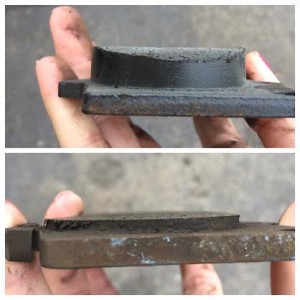You expect your car to come to a complete stop when you press the brakes, right? You expect to slow when you press them slowly. What happens if you press them and you start to hear squealing? How about grinding? And worst of all — the pedal goes down, down, down and your car isn’t slowing!? ACK!!!
Let’s talk about just the squealing and grinding as those are the most common issues, and stuff of every day life here at the shop. Your pads are made of a tough and rough compound, often ceramic or metal. Think “fingernail file”… that sandpapery surface. Your rotors are smooth. The scratchy pads squeeze on the rotor which makes the wheel slow or stop. After a while, the scratchy stuff will wear off, much like the sandy stuff on a file. When the scratchy stuff wears down, there are “squeal tabs” that are made PURPOSEFULLY to squeal when the pads get to that surface. The squeal tab makes noise when pressed against the rotor. If you hear grinding, you’re WAY beyond the squeal tab… your pads are worn down, and are likely digging into the rotors.
In addition to waiting for a squeal (which is supposed to be an alert, sometimes they simply don’t squeal, or you don’t notice), we have a better way of telling. We measure the thickness of your pads. That’s a surefire way to tell that you’re wearing down the life of your brakes. The photo above is (top) a brand new brake pad, getting ready to be installed…. see how thick it is? The photo above (bottom) is the old pad that is being removed from the same car… it’s old, thin and worn out.
We do brakes every day — we’re experts. Let us inspect your pads/rotors — it’s really important.


Recent Comments